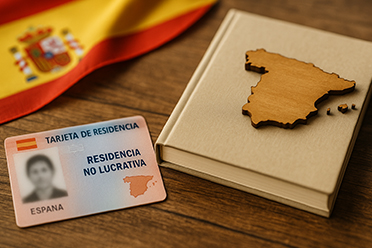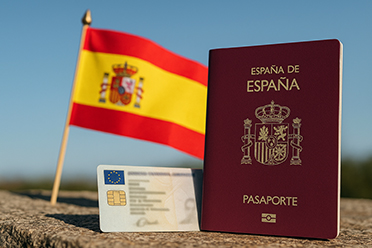
Switching from Tourist to Student in Spain
Have you arrived in Spain as a tourist or without the need for a visa and now wish to stay for academic purposes? You’re not alone—every year, hundreds of people discover new educational opportunities in our country and ask themselves: Can I stay legally to study? Is it possible to change my immigration status without leaving Spain?
The answer is yes. With proper legal assistance, the process can be much simpler. In this article, we explain step-by-step how to apply for a student stay permit in Spain—even if you entered as a tourist or without a visa—and how a lawyer in Barcelona specialized in immigration law can help you avoid errors and surprises.
What is a Student Stay Permit and Who Can Apply?
The student stay permit is an administrative authorization that allows foreign nationals to remain legally in Spain for more than 90 days with the purpose of pursuing full-time studies at authorized institutions. This legal framework is regulated by Article 37 of the Spanish Immigration Regulation (amended by Royal Decree 629/2022 and updated by RD 629/2024).
This is a commonly used option by international students who wish to pursue:
- University undergraduate degrees, official master’s degrees, or doctoral programs.
- Intermediate or higher vocational training (FP).
- Specialization courses at accredited universities or institutions.
- International mobility programs, including non-university ones.
- Language education in certified schools.
Who Can Apply?
This authorization may be requested by those who:
- Entered Spain with a short-term visa (Schengen tourist visa type C).
- Come from countries exempt from Schengen visa requirements, such as Ukraine, Georgia, Argentina, Chile, Colombia, Brazil, among others.
This means that it is not mandatory to apply for a student visa from your country of origin, provided that you comply with the legal deadlines from the date of entry into Spain.
📌 Important: If you entered without a visa due to exemption or with a tourist visa, you must file your application within the first month of your arrival in Spain. Late applications will not be accepted if you are in irregular status.
Applicable Legal Framework
Article 37 of the Spanish Immigration Regulation (RD 557/2011) expressly provides that:
“Foreign nationals who are legally present in Spain may apply for the student stay authorization, provided they do so within the first month of their entry and meet the requirements set forth in this regulation.”
This rule was reinforced by the reform published in the Official State Gazette (BOE) in 2024, which further simplified the process of modifying the student stay to a work and residence permit, and expanded the range of eligible educational programs, including certain private technical or vocational courses as long as they are authorized.
What Are the Requirements for Switching from Tourist to Student Status?
1. Compliance with the Legal Deadline
One of the most stringent—and often overlooked—requirements is the legal deadline for submitting the application. If you entered Spain as a tourist or without a visa, you have a maximum of 60 days from your entry date to apply for a student stay permit. This deadline is non-extendable.
⚠️ The Immigration Office may outright reject your application if it is submitted after the deadline, even if you meet all other requirements.
Why Do We Recommend Applying Within the First 30 Days?
Although the law allows up to 60 days, our experience as immigration lawyers in Barcelona shows that:
- It is often difficult to prove the exact date of entry, especially if you entered visa-free from a Schengen-exempt country. The passport may not be stamped by border police in such cases, and alternative evidence (such as flight tickets or local registration certificates) may be required, complicating the file.
- Spots in schools and academies fill up quickly; the sooner you apply, the easier it is to organize your enrollment, medical insurance, and other required documents.
- The closer you are to the deadline, the higher the risk that minor delays or document errors will disqualify your application.
🕒 Our advice: start the process as soon as you arrive in Spain. Within the first two weeks, you should have already chosen a school, prepared your documentation, and scheduled a legal consultation if you seek professional support.
What If More Than 60 Days Have Passed?
If the legal deadline has expired, you cannot apply from within Spain. Your only option is to leave the country and request a student visa from the Spanish consulate in your country of origin—this means additional costs, longer processing times, and more bureaucracy.
✅ Practical Summary:
- Legal deadline: maximum 60 days from entry.
- Recommended: within the first 30 days.
- If uncertain about your entry date, consult a lawyer to avoid irreversible mistakes.
2. Enrollment in an Authorized Educational Institution
A fundamental pillar for applying for a student stay permit in Spain is being enrolled in an officially recognized training center by the Spanish educational authorities. This requirement is not merely formal—the type of course and institution will determine whether your application is accepted or rejected.
What Type of Education Is Accepted?
To be accepted by the Immigration Office, your education must meet these essential criteria:
- It must be in-person or blended with mandatory attendance. Fully online courses are not valid.
- It must be delivered by an authorized institution in Spain—be it a university, business school, vocational institute, or accredited language academy.
- It must include a minimum of 20 hours of classes per week. This proves that your primary purpose is studying, not engaging in other activities.
What Types of Courses Are Admitted?
The following are generally accepted:
- Official undergraduate, master’s, and doctoral university programs.
- Intermediate or higher-level vocational training programs.
- Spanish or other language education in schools certified by the Cervantes Institute.
- Private technical or professional programs, provided they are duly accredited.
⚠️ Attention: Not all private institutions or academies meet the necessary criteria. Before enrolling, consult with a lawyer to ensure that your program is recognized by the Immigration Office.
Real-Life Example
María, a citizen of Georgia, arrived in Barcelona visa-free. She wanted to specialize in digital marketing and enrolled in a master’s program at a recognized business school. With her enrollment, proof of payment, and sound legal advice, she was able to apply for a student stay permit from within Spain, without needing to return to her country.
3. Proof of Sufficient Financial Means
One of the key aspects reviewed by the Immigration Office when evaluating your application is whether you can financially support yourself during your entire stay in Spain without needing to work.
To demonstrate this, you must prove that you have enough resources to cover living expenses, housing, transport, academic materials, and unforeseen costs.
How Much Money Do You Need to Show?
The financial requirement is based on the Public Indicator of Income for Multiple Effects (IPREM). According to current regulations (amended by RD 1155/2024), you must show at least 100% of the annual IPREM, which in 2025 equals approximately:
💶 €7,800 for a full academic year (or about €650/month).
This amount may vary depending on the duration of your studies and increases if you apply to bring family members with you.
How Can You Prove These Funds?
You may submit any of the following:
- Bank account in your name with sufficient accessible funds.
- Can be from a Spanish or internationally recognized bank.
- It’s advisable to include a recent statement of account activity.
- Economic sponsorship letter from parents or relatives, including:
- Copy of the sponsor’s passport or ID.
- Bank certificate showing sufficient funds.
- Sworn translation if the documents are in a foreign language.
- Official or private scholarship, if it fully or partially covers your costs.
- Proof of payment for your course and accommodation, if already prepaid.
✅ Our advice: If you rely on a family sponsor, ensure all documents are properly legalized and translated. The Immigration Office is very strict with financial proof.
What Happens If You Fail to Prove Sufficient Means?
Failure to prove financial solvency is one of the most common causes of denial. This is why professional support is vital—well-prepared documents can make the difference between approval and rejection.
4. Private Health Insurance
Having adequate private health insurance is another mandatory requirement for obtaining a student stay permit in Spain. Not just any policy is acceptable—immigration authorities demand specific coverage conditions.
What Must the Insurance Include?
According to the regulation (as modified by RD 1155/2024), the health insurance must:
- Cover the entire duration of your stay without gaps or waiting periods.
- Exclude copayments—meaning you cannot share the cost of medical services.
- Offer coverage equivalent to Spain’s public healthcare system, including primary care, emergencies, hospitalization, diagnostic testing, and specialist treatment.
🚫 Travel insurance policies with limited coverage, deductibles, or exclusions are not valid for this purpose. Many applications are rejected due to reliance on inadequate low-cost policies.
Which Insurers Are Accepted?
Although there is no official list, it is recommended to contract policies from well-known Spanish insurers experienced in student coverage. Among the most accepted by the Immigration Office are:
- Adeslas
- Sanitas
- Asisa
- Mapfre (specific no-copay policies)
- DKV
The policy must clearly state the following:
“Insurance with no waiting periods, no copayments, full coverage during the stay in Spain, and equivalence to the Spanish public health system.”
Should the Insurance Be Contracted Before Applying?
Yes. The insurance must be active at the time of submission and must cover from the first day of the intended stay. It is also recommended to submit proof of full payment of the policy.
5. Criminal Record Certificate
If your course lasts longer than six months—which is common for master’s programs, university degrees, vocational cycles, or annual language courses—you must provide a criminal record certificate issued by the authorities of your country of origin or the country where you have resided during the last five years.
This document is required to demonstrate that you do not pose a threat to public order or safety in Spain.
Requirements for the Certificate:
To be accepted by the Immigration Office, the certificate must:
- Be issued by the competent authority (ministry, prosecutor’s office, national police, etc.).
- Be legalized or apostilled according to the country of origin:
- If your country is part of The Hague Convention, the Apostille of The Hague will suffice.
- If not, consular legalization is required.
- Include an official sworn translation into Spanish, carried out by a certified translator in Spain or the competent embassy/consulate.
- Be recent—issued within 90 days prior to the application submission date.
📌 Advice: Don’t wait until the last minute to request this document. Processing can take weeks, especially if you are abroad or need additional legalizations.
What Happens If It’s Missing?
Failure to submit this document, or submitting it with defects, is a common reason for official requests or even outright denial. Our firm will help you determine whether your course requires this certificate and how to obtain and validate it properly from day one.
6. Medical Certificate
If your student stay in Spain exceeds six months—which applies to most master’s degrees, university programs, vocational training, or annual language courses—you must also submit an official medical certificate.
This document proves that you do not suffer from any of the diseases listed in the International Health Regulations of 2005, meaning you do not pose a public health risk to Spain.
What Must the Certificate Contain?
- It must be issued by a licensed medical professional in your home country or country of residence.
- It must explicitly state: “The applicant does not suffer from any diseases that may have serious public health implications according to the International Health Regulations of 2005.”
- It must be duly legalized or apostilled depending on the country of issue.
- It must be accompanied by a sworn Spanish translation if written in another language.
- It must be recent—no older than 90 days before submission.
📌 Practical Tip: Start the process early. In many countries, obtaining this certificate requires a doctor’s appointment, medical tests, and administrative waiting times. Ensure the wording is accurate and complies with Immigration Office standards.
Not providing the medical certificate when required can result in delays or even rejection. Our office ensures that no key document is missing from your file.
Additional Documentation to Strengthen Your Application
Although the Immigration Regulation does not require some documents explicitly, in practice we know that submitting a complete and well-justified file significantly increases the chances of a favorable outcome.
Here are some additional documents we recommend:
1. Proof of Accommodation
Demonstrating where you will reside provides certainty to the Immigration Office.
Acceptable documents include:
- Rental contract in your name.
- Local registration certificate (empadronamiento) if already registered at an address.
- Invitation letter or signed authorization from the person hosting you, with a copy of their ID or residence card.
2. Letter of Motivation
A short personal letter explaining your reasons for studying in Spain, your interest in the chosen course, and future plans. It shows academic commitment and coherence.
3. Language Proficiency Certificate
If the course is taught in Spanish, we recommend submitting an official language certificate (DELE, SIELE, etc.), especially if Spanish is not your native language.
4. Previous Academic Record
A summary of your previous education, obtained degrees, or certificates helps to demonstrate that your new course logically continues your academic path.
5. Proof of Continuous Financial Solvency
If you use a bank account as proof of funds, it’s useful to also submit:
- Bank ownership certificates.
- Recent account activity statements.
- Proof of regular income or employment of your financial sponsor.
🧾 Professional Tip: A well-documented application—even beyond the minimum requirements—can help resolve your case faster and avoid additional requests from the authorities.
Why Having a Lawyer in Barcelona Makes a Difference
Applying for a student stay permit in Spain might seem simple at first... until you face confusing forms, shifting requirements, rejected documents, or strict deadlines.
In our experience, more than 40% of denials we handle are due to avoidable errors made by applicants who tried to file alone. Immigration law is technical, frequently updated, and each case requires individual analysis.
With our legal support:
- ✅ We prevent errors that can cost you time, money, or your chance to study in Spain.
- ✅ We tailor your application based on your nationality, course type, financial profile, and migration history.
- ✅ We respond to official requests promptly, preventing your file from being blocked due to lack of response or poor argumentation.
- ✅ We represent you legally before the Immigration Office, defending your interests at every step.
- ✅ Most importantly: we provide peace of mind, with a seasoned legal team experienced in immigration procedures from Barcelona.
📍 Our law firm is based in Barcelona, but we also assist students across Spain via video consultations. We speak your language and understand your concerns.
Do You Want to Study in Spain Without Legal Complications?
Studying in Spain could be the beginning of a new journey: education, opportunities, personal and professional growth. But that first step—obtaining your student stay permit—can be challenging without proper support.
At our immigration-focused law firm in Barcelona, we help you handle your application without mistakes, confusion, or needing to return to your country. We manage the entire legal process so that you can focus on what matters most: your academic future.
📌 We offer:
- Personalized consultations in Barcelona or via video call.
- File review and submission with professional legal assistance.
- Clear communication, prompt service, and ongoing updates.
Don’t leave your project to chance. Trust a team with experience, empathy, and full commitment to your case.
👉 Contact us today to schedule your first consultation
With the right support, everything becomes easier. We listen, guide, and accompany you every step of the way.
 Non-Lucrative Residence in Spain: Live Legally Without Working, Backed by Legal Expertise
Non-Lucrative Residence in Spain: Live Legally Without Working, Backed by Legal Expertise





 Get your digital nomad visa in Spain with ExLege Abogados
Get your digital nomad visa in Spain with ExLege Abogados